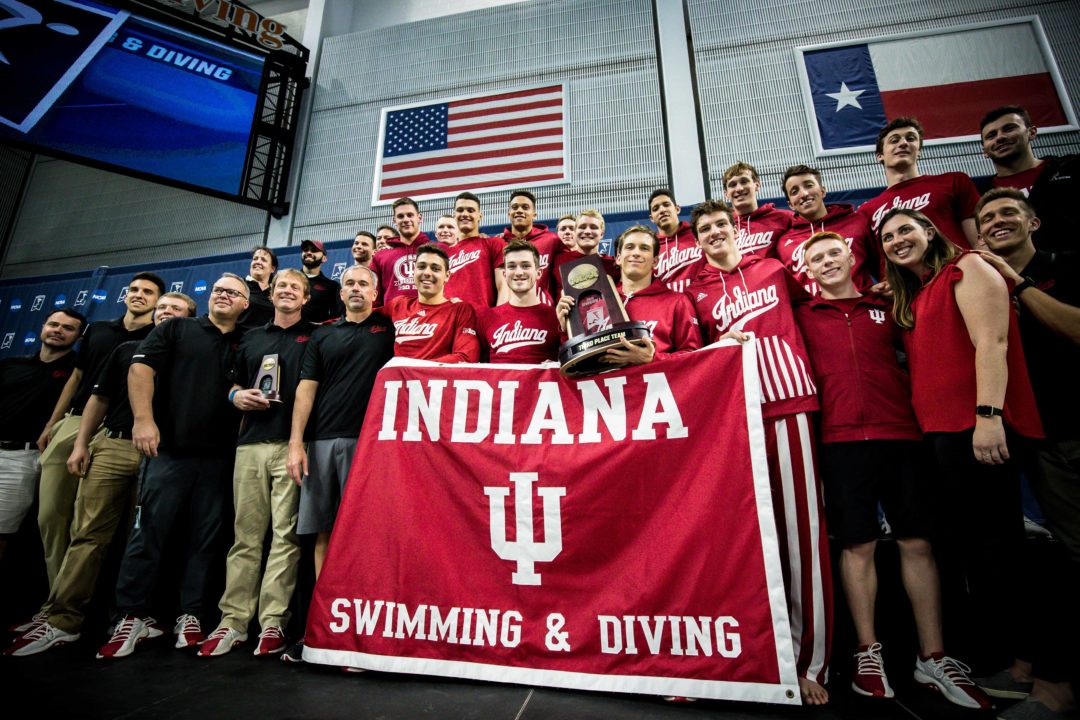The Indiana Hoosiers have a unique way of combining underwater video and a weight-bearing pulley system – and now they’re sharing their intel with SwimSwam readers.
After teasing the system on the SwimSwam Podcast a few weeks back, Indiana head coach Ray Looze and his staff shared the secrets behind an underwater video system that they say has dramatically undercut the $50,000-per-year cost originally quoted. Thanks to some creativity and ingenuity from the coaching staff, especially diving coach Drew Johansen, the team managed to put together their own version of the system for a dramatically smaller price tag.
This has the possibility of dramatically improving access to such a system to teams across the country, elevating the sport of swimming as a whole.
We connected with the IU program to get the scoop on the video-and-pulley system, and to help other coaches implement something similar in their programs. First of all, here’s a video courtesy of the Hoosiers social media team that shows how the system looks and functions, along with some top IU athletes talking about what they’ve learned by using it:
On his recent SwimSwam Podcast appearance, Indiana head coach Ray Looze talked about the importance of “carrying ability” and body control to fast swimming – and his staff says the pulley/video combination allows athletes to hone in on body position and technique.
“The best way to correct technique is with resistance,” said assistant coach Luke Ryan. “If swimmers can see what they are doing while on the pulleys they can improve technique exponentially.
“It is ideal to use the pulley system in conjunction with the live delayed video. We typically use a delay of 10 to 15 seconds. This gives each swimmer a chance to watch several cycles of their stroke then move onto their next repetition.”
Pulley System Walkthrough
Here’s a PowerPoint presentation Ryan put together to set up the pulley system.
The pulleys will need anchor points on the top and bottom. The PowerPoint includes instructions for threading the cables.
Video System Walkthrough
Indiana uses an Apple TV system on a 10-15-second delay. Here’s a look at all the equipment and how to set it up, courtesy of coach Ryan:
On the cart, we have an underwater and above water camera. Right now, the software only allows for above or below at one time, but they are working on having both playing on the screen at the same time. The only things you need are below the water. They even build the below water camera mounts and make custom cables for each set-up. Just an FYI, we are no longer charged for POE switch, POE adapter, Custom network cables, patch cables, etc (make sure to ask for this).
Equipment:
- TV – I suggest getting one in 4k. we use Samsung (series 6) – $350
- Apple TV 4k, 32G. You don’t need the larger memory option – $179
- HDMI cord – $10
- Underwater Camera – $325
- Above water camera (we made the mount // also this is the least used camera) – $199
- 1 year software subscription (this works on as many TVs as you have). – $400
- Go through Steve (below) to get the software subscription)
- Underwater camera mount – Included in underwater camera cost now
- Cart – you can find one on Amazon for less than $100
My contact at the company is Steve Smallwood – [email protected] He will get you set up with the camera, mount, wiring, and subscription
How It Works
When TV and Apple TV are turned on…
- Press button that looks like a TV screen
- Go to the poolside live app (click on it)
- When the app launches, click on available camera(s)
- Wait. The camera has to create a delay.
- To change cameras, press the menu button and scroll down to “all cameras”
Controls:
- Swipe left: moves the video back 5 seconds – you can adjust this
- Swipe right: frame by frame moving forward
- Swipe up: back to live TV (12 second delay) – you can adjust the delay
- Swipe down: bring up more controls

They need a how-to guide on using the transfer portal
Guerra with the downvote
This article is just Guerra fuel!
The greatness of Indiana University and GOAT Coach, Ray Looze, sponsors itself… And, by the way, I’m wearing my GOAT Coach, Ray Looze “Coach of the Year” t-shirt today. Let me know if you’d like to buy one!
This is why, if you want to achieve things you never dreamed were possible, you need to come to Indiana University to swim for GOAT Coach, Ray Looze. The man has more heart than anyone in coaching and he’s truly a genius!
Where’d the capslock go today, Guerra? Need a coffee?
You have to see it to believe it. When Ray and former IU coach, Donny Brush, set this system up years ago, it was a game changer for the sprint program. Now everyone in the program uses it and some people do it 5x a week. You can run a good pulley program without the video. From my perspective, the video makes a big difference in that the athletes can get instant feedback on their stroke. The whole thing is definitely cutting edge. #lovegoatcoachraylooze, #honorgoatcoachraylooze, #cherishgoatcoachraylooze
Who is Guerra?
seems wild to use an apple tv to control your video systems and storage, but it must be quite the software for it to be worth the expense. what exactly does the software do besides let you record and play back video?
Pure speculation from the perspective of a software developer: they use iPhones and iPads as the primary way to control the system, so the developer skills & some code can be shared with the Apple TV.
Makes sense actually